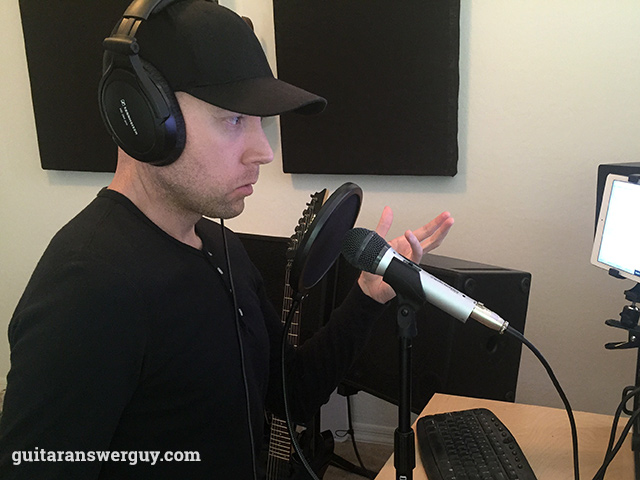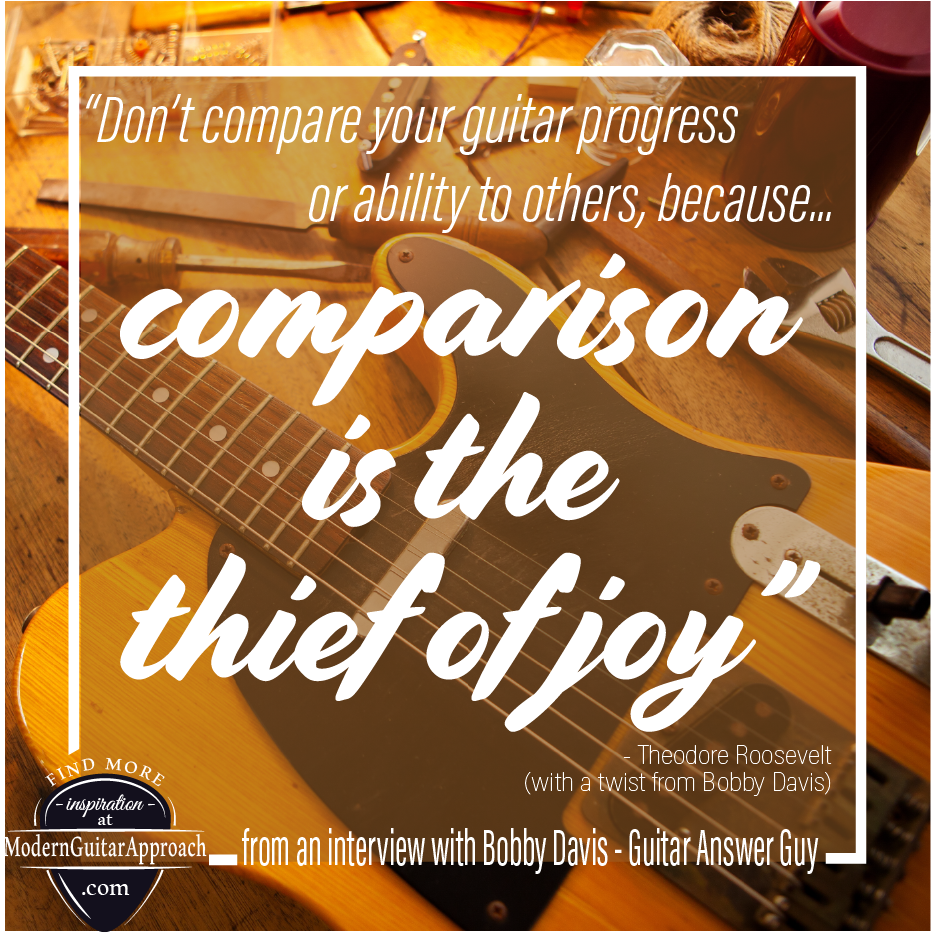an interview with Bobby Davis, the Guitar Answer Guy
In my interview with Bobby Davis, you will learn about the man behind the website, what motivated him to want to start playing the guitar and how he got into doing his own guitar work.
You will also learn why you should do some of your own guitar care and get some tips on how to best go about it. Lastly, this interview is full of great advice and tips to help keep you motivated and moving forward as a guitar player.
Bobby’s website (www.guitaranswerguy.com) is full guitar of care how-to’s, product reviews, and product recommendations. It has been a helpful resource for me and one that I have sent some of my own private students to at times when they have had questions about guitar maintenance. I like the way he explains things and figured his insight could be valuable my readers so I asked him for an interview.

First, I asked Bobby some questions about how he got started because I think it can be helpful for beginning guitar players to to see that everyone has to start somewhere.
You mention on your website that you started playing guitar in 1987. What was your inspiration for wanting to learn the guitar?
My dad had always played acoustic guitar, but I never took much of a personal interest in it until around age 12 (1987). I’d started listening to a lot of guitar-heavy music–bands like Metallica, Megadeth, Testament, etc., as well as listening to guitar gods like Steve Vai, Joe Satriani, Yngwie Malmsteen, and others. That music inspired me to start playing my dad’s acoustic guitar, in the hopes that I might one day create the kind of music I was hearing, write my own songs, and just generally express myself musically.
What do you remember about those first few years of learning guitar? What was difficult to learn?
My first year was really frustrating because it was exclusively on acoustic guitar. That’s all my dad had, and he was one of those who also believed people were supposed to learn on an acoustic first. Screw that. I wanted to know how to play Master of Puppets and Crazy Train. So that’s a piece of advice I give every beginner: buy the type of guitar and gear that’ll inspire you and allow you to make the sounds you actually want to make. It’s a myth that you have to start with an acoustic guitar. In my opinion, you can even start with a 7 or 8-string guitar if that’s what your favorite bands or artists are playing.
The thing that was most difficult for me in those early days was switching between chords. Switching between the basic 1st position chords was a huge physical challenge for me for a long time, and I even struggled with chord-switching using simpler power chords.

What did you enjoy most when you were first learning guitar?
What I enjoyed the most was when I started high school and began meeting other guitar players. They were all older, had electric guitars, distortion pedals, and were great rock and metal players. Those guys were really forthcoming with information–they essentially gave me the keys to the Lamborghini. I finally knew how to get that rock/metal sound (e.g. using a distortion pedal), and they showed me techniques like power chords, hammer-ons, legato, etc. That’s when I started practicing obsessively. The guitar became my world and “guitar player” became my identity. That’s also when I resolved to start saving up to buy my first electric guitar.
Why did you you become interested in guitar maintenance and care?
It began with a tragedy of sorts.
As a teen, I worked extra hours for months at my fast food job to finally afford my first “real” electric guitar: an Ibanez RG550. It was my dream guitar, but I had NO idea how to tune it or even change the strings, because it had a floating Floyd Rose tremolo. So, I had to take it to the music store to have the action lowered.
A week later I went to pick it up and was so excited (and naive) that I didn’t even open the case. I just paid the guitar tech and sped home to play my “professionally setup” guitar.
When I got home and opened the case, my mouth went dry and my heart sank into my stomach.
There were two huge chips in the beautiful blue paint of the body. One was so deep that the wood was showing.
The guitar tech at the store denied all responsibility, and even had the audacity to say “it was like that when you bought it in kid.” They refused to do anything to fix the damage they’d done.
That’s when I resolved to learn to do as much of my own guitar care and maintenance as possible, and only surrender my guitar to someone else when absolutely necessary.
I told another local luthier about my incident, and he was so appalled by my story that he began giving me a lot of great repair and setup tips–essentially mentoring me. He also recommended books and videos that I could watch to learn more on my own. I discovered that I really enjoyed tinkering and working on guitars, and in the following years learned WAY more than the average guitar owner really needs to know.

Why is important for guitar players to learn about guitar maintenance and care? Why should this aspect of guitar playing not be overlooked?
- You’ll keep more money in your pocket
- You won’t have to be without your guitar for days or weeks while it’s in the shop
- You’ll be able to set it up exactly how you like it
- You’ll reduce the likelihood of experiencing what I did: someone else damaging your guitar
As a guitar owner, you should at least know how to change your own strings, clean your guitar using the right products, and store it properly. A big bonus is eventually learning how to do a complete setup of your guitar.
My feeling is that you should only take your guitar to a pro when something is really wrong or you need something serious, like fretwork or major repairs. Though rare, accidents can happen in the shop, so why not minimize that risk? To this day, I still take my guitars to my favorite shop for the more complicated work, but otherwise try to do most things myself.
You spent two years running your own “guitar tech” business. What did that business mostly entail? What was something you learned from those two years about guitars that would be helpful for others to know?
I was in the Air Force at the time and stationed on Misawa Air Base in Japan, which had a really nice woodshop that was open for recreational use. It was 1996 and by this time I’d learned so much about guitar tech that I started doing basic guitar and bass setups for the other people on the base. I had originally intended it to be just setups and basic maintenance, but over the next 2 years customers kept asking for more and more complicated work. So, I eventually progressed into doing minor finish repairs, fretwork, and some more advanced repairs.
Something I learned that would be helpful for others to know is how much humidity affects guitars, especially acoustics. Acoustic guitars are most susceptible because they’re made of thinner sheets of wood, have thinner (and more) glued parts, and are unfinished and unprotected inside. So, they tend to swell and contract a lot more with humidity changes. Electric guitars are less susceptible, but can still develop problems if left unprotected too long in very low or very high humidity.
Get a Digital Hygrometer (click to see Bobby’s hygrometer recommendation here)to see where you stand, then take the appropriate corrective action (if necessary). It’ll usually vary depending on the time of year. If that sounds a bit daunting, simply keeping your guitar sealed in a good case when you’re not playing it will help a lot. For both electric and acoustic guitars, 45% – 55% humidity is the safe zone.

What type of music do you listen to? What type of music do you like to play?
I’ve been a metal head since my pre-teen years. My all-time favorite genre is Progressive Metal, as I’ve been a Dream Theater fan since their very first album. Nowadays, I’m a big fan of some of the newer Prog bands like Animals as Leaders, Periphery, TesseracT, etc. I also really like a lot of the newer guitar virtuosos like Angel Vivaldi, Plini, Sarah Longfield, Nili Brosch, and a bunch of others.
A lot of my readers are beginning guitar players. When someone first gets a guitar, what are the first few things they should do to take care of it and make sure it’s playing properly?
Get a “full setup” by a qualified luthier, guitar tech, etc. A “setup” is the guitar equivalent to getting your car tuned-up by an ace mechanic.
Many people are surprised to learn that brand new guitars are rarely set up properly. They’ve either been hanging on the wall in a showroom for months or have endured the rigors of shipping. Whatever the case, most new guitars need a full setup to sound and play their best. If you buy your guitar in a music store, many will do a setup as a courtesy, but not always. So, be sure to ask for it.
Tell whoever’s doing your setup that you’re a beginner and want really light-gauge strings and the action set as low as possible without excessive string buzz. This’ll help you power through the early hurdles of finger pain, building hand strength, and building dexterity. You can always raise your action and/or move up to heavier strings later if you’d like.
If you only had the budget for a couple of guitar care products, what would they be and why?
- A string winder. This’ll make string changes a lot easier and faster. The cheap little manual kind are fine and will serve you well for years… or forever, if you choose. Those also usually include a notch for pulling acoustic guitar bridge-pins, which is really helpful.
- A few soft, 100% cotton cloths for general cleaning (check out Gerber Birdseye 3-Ply Prefold Cloth Diapers, White, 10 Count on Amazon). I prefer 100% cotton cloth baby diapers. Using t-shirts or old clothing can be risky because, despite feeling soft to the touch, they can sometimes create micro-fine scratches that don’t become obvious until later down the road. Music Nomad’s microfiber guitar polishing cloths are great too (find the MusicNomad MN202 Edgeless Microfiber Guitar Cleaning & Polishing Cloth here on Amazon). Dedicate one cloth for wiping your fretboard and strings, and dedicate another cloth for cleaning the glossy clearcoat on the body and headstock (and the back of the neck, if yours is glossy).
- String cutters (or side-cutters). Here’s another tool that’ll make string changes easier and faster. If your guitar has steel strings, trying to manually uncoil and pull the strings from the tuning pegs can be a difficult (and painful) process without string cutters (Bobby recommends the Music Nomad MN226 Grip Cutter – Premium String Cutter found here on Amazon).
- A humidity control solution if you have an acoustic guitar and/or live in an extremely dry or wet climate. Guitars need to be kept in humidity somewhere between 45% – 55%. So, get a digital hygrometer to keep an eye on the humidity wherever you tend to store your guitar, and take corrective action as needed (Bobby recommends the D’Addario Accessories Humidipak Two-Way Humidification System found here on Amazon).

Some out there will be asking: “What about guitar polish, fretboard oil, or string cleaner, or…?” Honestly, none of that is really critical. Those are nice-to-have items that you can buy if you have the budget, but reality is: you can care for a guitar with nothing more than a couple soft cotton cloths and regular ole water. Just use water very sparingly, especially on exposed wood like the fretboard. Also, hot-breath-fog and saliva will remove sweat, oil, and dirt quite well. However, never spit on on someone else’s guitar! Reserve mom’s saliva dirt-removal-method for your own axe.
Do you have any tidbits of wisdom, motivation or advice you’d like to pass on to guitar players who are just getting started?

- Don’t compare your guitar progress or ability to others. Comparison is the thief of joy. The coming of the internet has been both a blessing and a curse in this regard. On one hand, we now have an unlimited amount of free information available. On the other hand, it’s revealed how many 8-year-olds out there could absolutely annihilate us in a guitar duel. This can be really discouraging for guitar players (of all ability levels) if they obsess about it instead of focusing on achieving their own guitar goals or playing guitar for the sheer joy it brings.
- Try to hang out with other guitar players whenever possible, even if they’re better than you. ESPECIALLY if they’re better than you. They say you’re the average of the 5 people you spend the most time with, so if a big goal of yours is to become a better guitarist, then hang out with guitarists that are better than you. This will naturally make you a better player.
- Do take private, in-person lessons if you can. This doesn’t necessarily need to be a big long-term commitment. It’s okay to take one-off lessons here and there. I still occasionally take an in-person or Skype lesson if I’m feeling stuck, unmotivated, or just want to juice my creativity a bit. There’s just something… different… about interacting with a guitar teacher one-on-one. Books and pre-recorded videos definitely have their place, but I always recommend that guitarists at least occasionally take an in-person lesson if they can. Skype counts too. The key is that it’s live and that you can interact and get real-time feedback from an expert.

Bio
As a teen, Bobby Davis’ first guitar was severely damaged by a guitar store that he took it to for a basic setup. They denied responsibility and refused to fix the damage. That’s the day day Bobby vowed to learn how to do most of his own guitar work. Today, Bobby helps new guitar owners do the same and, more importantly, know when a procedure truly should be left to a pro luthier or guitar tech. You can read guitar care how-to’s, product reviews, and product recommendations on his website at: www.guitaranswerguy.com
IMAGE FOR PINTEREST
